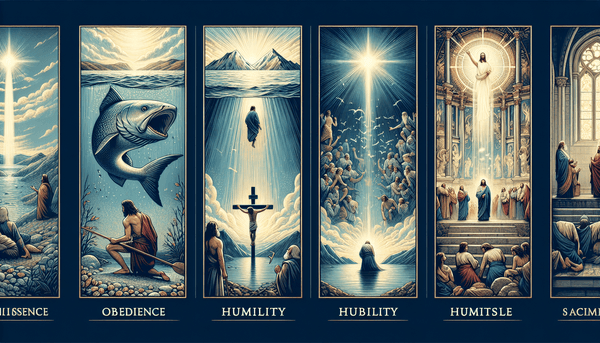Humility as a Christian Virtue
Humility is a foundational virtue in Christianity, shaping the way believers interact with God and each other. Scripture advises to 'Humble yourselves before the Lord, and he will lift you up,' as in James 4:10, highlighting the exaltation that follows true humility. The Apostle Paul, in Philippians 2:3, urges believers to 'Do nothing out of selfish ambition or vain conceit. Rather, in humility value others above yourselves,' setting a standard for interpersonal relationships that reflect Christ's selflessness. This approach is further exemplified in Micah 6:8, which describes what the Lord requires of us: to 'act justly and to love mercy and to walk humbly with your God.' The essence of humility is captured in Proverbs 22:4, promising reward, and 1 Peter 5:6, which counsels submission under God's mighty hand for eventual exaltation.
The Seven Last Sayings of Jesus on the Cross
The final utterances of Jesus Christ on the cross encapsulate His enduring love, sacrifice, and the fulfillment of His mission. His first saying, 'Father, forgive them, for they do not know what they are doing' (Luke 23:34), embodies an unparalleled forgiveness even amidst His own suffering. The promise of salvation is clear in His assurance to the penitent thief, 'Today you will be with me in paradise' (Luke 23:43). Jesus' concern for His mother and His disciple John is evident as He addresses them in John 19:26-27. His cry of desolation, 'My God, my God, why have you forsaken me?', reflects the depth of His suffering while fulfilling the prophecy of Psalm 22:1. Ultimately, His last words, 'Father, into your hands I commit my spirit' (Luke 23:46), show complete surrender to the Father's will, as echoed in Psalm 31:5 and celebrated in Hebrews 12:2. For a deeper understanding of the path to salvation and the anticipation of Christ's return, consider the insights offered in our article on divine guidance and the rapture.
Conclusion
The biblical narratives of Jonah, the virtues of humility, and the final words of Jesus encapsulate profound spiritual truths that resonate across the ages. They teach us about the importance of obedience, the power of humility, and the ultimate expression of love and sacrifice. These stories inspire believers to reflect on their own lives and encourage them to live in accordance with the divine will, as discussed in our exploration of Paul's letters. To esteem others more highly than themselves, and to trust in the redeeming work of Christ. As we contemplate these timeless lessons, we are reminded of the depth of God's love for humanity and the transformative power of living a life anchored in faith and devotion.
FAQ
Q: What is the significance of the great fish in the story of Jonah?
A: The great fish is seen as an instrument of God's will, both in disciplining Jonah for his disobedience and providing him with an opportunity for reflection and repentance.
Q: How is humility portrayed in the Bible?
A: Humility is portrayed as a virtue that involves recognizing God's sovereignty, valuing others above oneself, and living out justice, mercy, and humble service.
Q: What can we learn from the seven last sayings of Jesus on the cross?
A: The seven last sayings of Jesus on the cross teach us about forgiveness, promise of salvation, provision and care, fulfillment of prophecy, and the importance of trusting in God's will.
Q: Are the stories of Jonah and Jesus connected?
A: Yes, Jesus refers to Jonah's experience in the belly of the fish as a sign that prefigures His own death and resurrection, emphasizing the importance of repentance and God's mercy.






